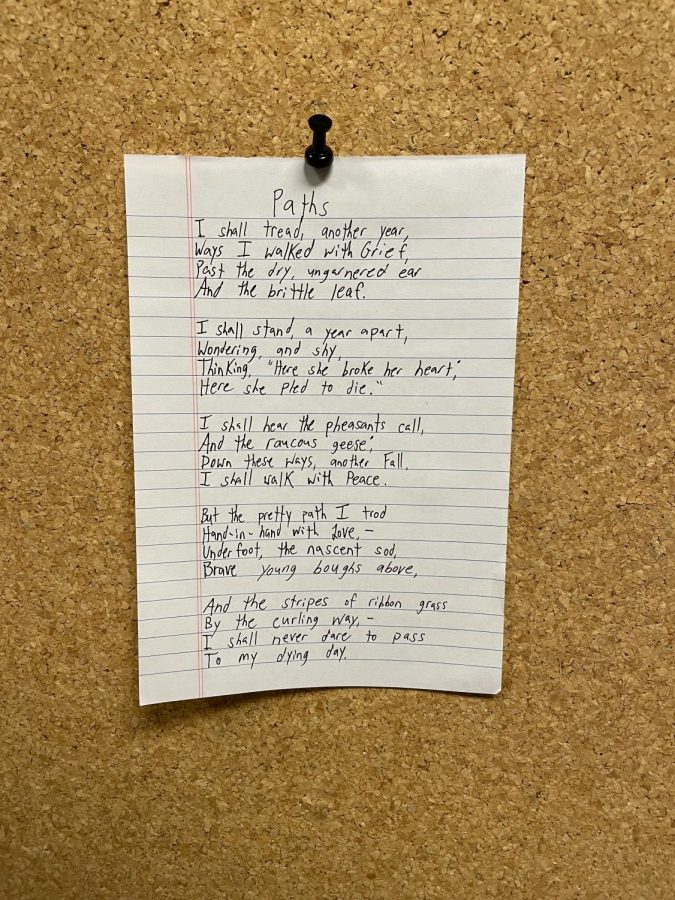Gabbing with Grace: seasons of change
Managing Editor Grace Sherban exposes her juvenile handwriting as a way to include Dorothy Parker’s “Paths” in this edition of Gabbing with Grace
Apr 28, 2023
“April Come She Will” by Simon & Garfunkel
April, come she will
When streams are ripe and swelled with rain
May, she will stay
Resting in my arms again
June, she’ll change her tune
In restless walks she’ll prowl the night
July, she will fly
And give no warning to her flight
August, die she must
The autumn winds blow chilly and cold
September, I’ll remember
A love once new has now grown old.
One inescapable aspect of life is change. It will follow us no matter how hard we try to resist and, despite our current comforts, routines will inevitably be uprooted to cater to a new normal. The exact reason for change can range but one thing remains the same: change is impactful; change is never ending.
Is anyone surprised that I am once again going to talk about change in another edition of “Gabbing with Grace?” With the end of the semester rapidly approaching, change has been on the forefront of my mind yet again. This go around, I want to take a look at a Simon & Garfunkel song and a Dorothy Parker poem that use changes in the seasons to convey personal change.
“April Come She Will” comes off the duo’s second album, “Sounds of Silence,” and reads more like a poem than a traditional song. In only three rhyming verses consisting of five lines each, the tune tells an entire love story which culminates in a love decaying. Starting in April, the song documents a change of heart in a relationship which mirrors the change in season.
The final line of the song is the most important part and I think it says a lot about this cyclical world we inhabit. “A love once new has now grown old.” No matter how much we try to stop it from happening, the most important things in our lives will grow old and die. Something, in the song’s case a romantic relationship that was once delicate and beautiful becomes unrecognizable, like dust slipping through the cracks of time.
Similarly, the poetry of Dorothy Parker echoes many of the same concepts and ideas that exist in “April Come She Will.” The poem below pairs perfectly with this song but, if you feel so inclined, I would recommend reading “Paths” which is a longer poem regarding the same subject.
“Autumn Valentine” by Dorothy Parker
In May my heart was breaking-
Oh, wide the wound, and deep!
And bitter it beat at waking,
And sore it split in sleep.
And when it came November,
I sought my heart, and sighed,
“Poor thing, do you remember?”
“What heart was that?” it cried.
“Autumn Valentine” begins in May after Parker presumably went through a situation that caused her heart to “break” and the first stanza reveals this sense of inner turmoil that has consumed both her nights and days. This pain that Parker feels is all encompassing and is slowly eating away at her broken heart. The next stanza aims to follow up on this hurt that her heart once felt but the poem ends with her own heart not being able to recognize or remember the hardship it went through.
To me, this poem is all about brokenness and how a lack of emotional accountability can leave people with an inability to recognize themselves. By pushing away the pain that was once associated with good memories, Parker is left with neither pain nor its predecessor: joy.
However, this closure comes at the cost of her own personality and outlook being forced to change. We can become shells of our past selves if we choose to bottle away the good, the bad and the ugly that come from any significant experience or relationship in our lives.
What I find so impactful about these two pieces of art is the idea of decay. Our surroundings are constantly decaying around us with every change in the temperature. Pumpkins rot. Snow melts. Flowers wilt. Yet, we know that they will come back with time. Unfortunately, the same cannot be said for the people that are at the heart of this song and poem.
Despite this somber message, it is important to recognize how truly beautiful our lives are no matter the struggles we go through. Somehow, all of the darkness in life becomes a little less gloomy when the sun begins to shine on a bright: May morning. And even when the snow clouds form, there are always blooming flowers to look forward to.
C.S. Lewis once wrote, “Isn’t it funny how day by day nothing changes but when we look back, everything is different?”
Rain will come and go but it is ultimately up to us to determine what we choose to remember from a rainy day. Do we just remember the rain or the little moments shared with others?













